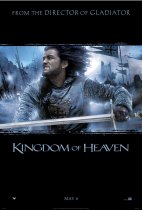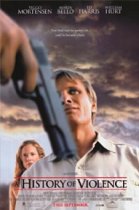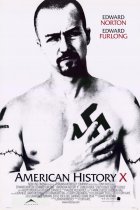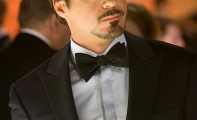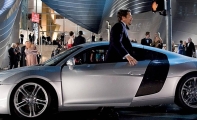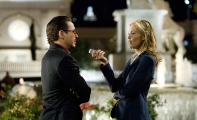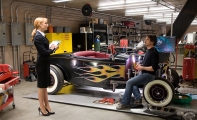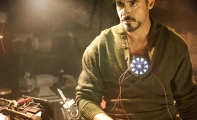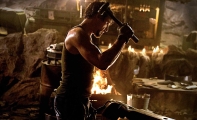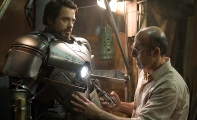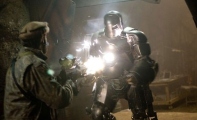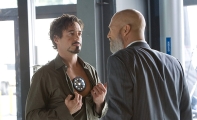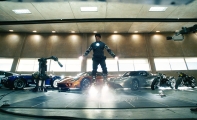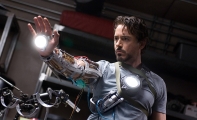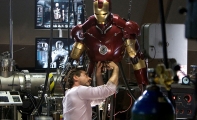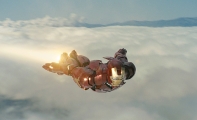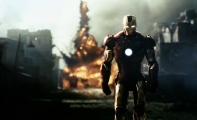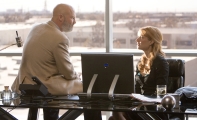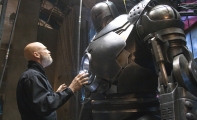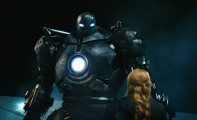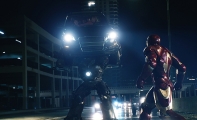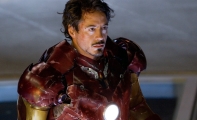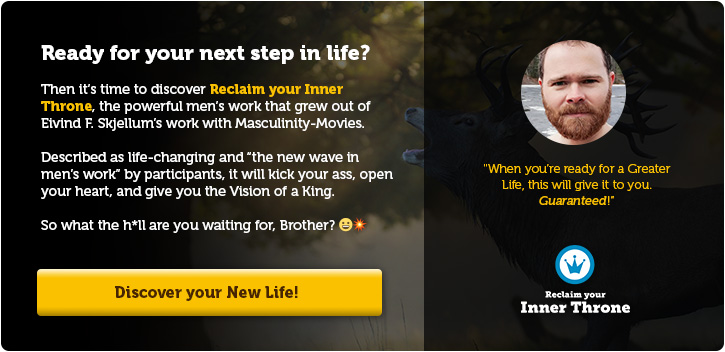Iron Man (2008)
Synopsis
Tony Stark has it all. He’s a living embodiment of the masculine ideal of the American Dream: a fabulously wealthy inventor, industrialist and playboy, a celebrity power broker adored by the media and the public alike. But beneath the slick, shiny surface of his apparently perfect life, there’s a vast emptiness in Stark that fast living, fast money, fast cars and fast women can’t fill. And he’s about to come face to face with that emptiness as he battles for his very survival in the last place on earth he ever imagined he’d find himself. In the process, he’ll forge a new identity and begin to address the hollowness and corruption that have been eating away at his life.

| Genre | Action |
| Production year | 2008 |
| Director | Jon Favreau |
| Male actors | Robert Downey Jr, Terrence Howard, Jeff Bridges |
A heart forced open by trauma
by Rick Belden
Tony Stark was born heir to an empire. His father, Howard Stark, was a brilliant man who founded Stark Industries and made his fortune as a weapons developer. Young Tony was a child prodigy, a true >wunderkind> who built his first circuit board at age four and his first engine at age six, graduated summa cum laude from MIT at 17, and took over as CEO of Stark Industries at 21 following the tragic and untimely death of his father and mother in a car accident.
He seemed to be following an arc that led him ever upward to more success, more recognition, more power, more glory, more of everything, on and on without end, at least in his outer life. When we meet Tony Stark at the beginning of the movie, he’s in his early forties. He’s been running Stark Industries with the assistance of Obadiah Stane, his late father’s friend and partner, for twenty years or so, and by every external measure, doing quite an excellent job of it. The company is highly profitable and is a worldwide leader in the development and delivery of high-tech weapons systems.
Stark, who has never married and has no children, lives by himself in a stylish cliffside estate complete with a state-of-the-art laboratory/workshop in the basement, a garage full of pricey sports cars, a bedroom with a panoramic view of the ocean, and an omnipresent artificial intelligence application that functions as his virtual valet and lab assistant.
Wonder boy / flying boy
On the surface, it all looks pretty good. But a closer examination of Stark’s lifestyle reveals some cracks in the glossy facade. Despite all of his material success, something about him seems unreal, incomplete. Much of his personal behavior is downright adolescent. He still parties like he’s in his twenties and he’s still taking the “fuck ’em and forget ’em” approach with women. He’d rather gamble than show up for an award ceremony in his honor that he’d promised his best friend, Air Force officer James “Rhodey” Rhodes, he’d attend, leaving Rhodey holding the bag and looking foolish.
Stark’s girl friday, Pepper, takes care of all of the details and issues in his life that he’s “too busy” to handle, including selecting and buying her own birthday present from him. There’s clearly a shared attraction and affection between the two of them, but he keeps her at a distance, as he does with everyone.
He’s more intimate with her than with any woman in his life, intimate in every way but the physical. He depends on her, telling her at one point, “I don’t have anyone but you,” but demonstrates little interest in her needs and little knowledge of who she really is. It’s as if, despite his swinging lifestyle and his long string of sexual adventures, he really has no idea what women are actually like.
Stark is glib, arrogant and has a ready answer for just about anything. When he’s confronted by a female reporter who presses him to take responsibility for making his fortune creating and selling products designed solely to kill and destroy, he cites his father’s work on the Manhattan Project “to defeat the Nazis” and then manages to turn the conversation into yet another opportunity for seduction.
He takes nothing and no one seriously. Nothing is ever at stake. Despite all his innate gifts and all his success, he is, at his core, deeply bored and very immature, both psychologically and emotionally. He is, in Jungian parlance, a >puer aeternus>: an emotional adolescent in a man’s body, a boy playing at being a man, a flying boy. But he’s about to come to ground.
The wasteland
Stark’s vanity and hubris lead him into the very place he least wants to go. In his supreme arrogance, he believes that he’s safe anywhere on earth and travels into a war zone in Central Asia to preside over a live field demonstration of his latest “masterpiece of death,” the Jericho missile. The demonstration is a big success, but on the return trip Stark’s convoy is ambushed and attacked. His military escorts are killed and he is left alone, forced under fire to leave the secure armored vehicle in which he’s been travelling and thrust out into a barren wasteland with nothing but the clothes on his back.
For perhaps the first time in his life, alone and vulnerable, Stark knows real fear. His power back in what he’s always thought of as “the real world” means nothing here. As he cowers behind a rock, trying to reach Stane on his cell phone, his attackers launch a missile that almost lands in his lap. Before it detonates, he has just enough time to see the manufacturer’s logo on the side of the weapon: “Stark Industries.”
The wound
Stark sustains a critical chest wound as a result of the explosion, with shrapnel closing in on his heart, and is taken prisoner by his attackers. Realizing that Stark has value for them, his captors direct another prisoner, an older man named Yinsen, to perform emergency surgery on Stark to save his life. But as Yinsen tells Stark when he recovers consciousness after his surgery, the reprieve is only temporary:
Yinsen: I removed all the shrapnel I could, but there’s a lot left, and it’s headed into your atrial septum … I’ve seen many wounds like that in my village. We call them the walking dead because it takes about a week for the barbs to reach the vital organs.
Stark (pointing to a device mounted in the center of his chest): What is this?
Yinsen: That is an electromagnet, hooked up to a car battery, and it’s keeping the shrapnel from entering your heart.
Stark is, of course, horrified to find himself wired to a car battery with an electromagnet implanted in his chest, cut off from everyone he knows and held prisoner in a dark cave in the middle of who-knows-where by a gang of violent thugs. But things are about to get even worse.
The cave
Stark’s captors demand, as a condition for his safe release and return to America, that he build them a weapon like the Jericho missile he demonstrated, using their massive stockpile of Stark Industries weaponry as raw material. Stark is appalled to find his own creations in the hands of such men and realizes that no matter what he does for them, they’ll never set him free. His initial reaction is despair. He feels as if he has no options and no hope. But Yinsen is unwilling to let Stark off the hook. He confronts him, challenging him to do something with whatever may be left of his life:
Yinsen: Look, what you just saw, that is your legacy, Stark. Your life’s work, in the hands of those murderers. Is that how you want to go out? Is this the last act of defiance of the great Tony Stark? Or are you going to do something about it?
Stark: Why should I do anything? They’re going to kill me, you, either way. And if they don’t, I’ll probably be dead in a week.
Yinsen: Well then, this is a very important week for you, isn’t it?
The man for whom nothing was ever at stake now rises to the challenge, using his gifts and his innate ingenuity to develop a method of escape, not only for himself, but for his fellow prisoner, a man in whom he has found a friend and a mentor, maybe the first true mentor he’s ever had.
Under the pretense of building the missile demanded by their captors, Stark and Yinsen instead build a crude mechanical armored suit, powered by a small “arc reactor” Stark fabricates on the fly using parts scrounged from the weapons he’d created. The arc reactor serves an additional purpose: it replaces the electromagnet and the car battery, thus keeping the shrapnel out of Stark’s heart and keeping him alive.
During their time in the cave building the armored suit, Stark and Yinsen continue to deepen their bond. As they talk about their lives back home, the emptiness of Stark’s life prior to capture is readily apparent to Yinsen, who tells a visibly shaken Stark, “So you’re a man who has everything and nothing.”
A new man
Stark eventually leaves the cave and enters the outside world again. His use of the armored suit to escape his captors is successful, but comes at a high price in the form of someone else’s sacrifice. After three months in captivity, he’s rescued in the desert by his friend Rhodey and returns home to Pepper, Stane and an adoring media as a hero. But he’s not the same man who left.
His ordeal has forced him open in a way he never anticipated and had never experienced before. His heart has been opened, literally. Life is precious and death is real to him now. He understands that his actions have consequences. Having begun to encounter the shadow side of his empire in the Central Asian wasteland, he feels moved to make changes. The profound new sense of responsibility he feels is not imposed by society or any other external force or definition of morality; it’s a responsibility born of his reconnection to his own humanity, and that of others.
Stark has begun to feel. He’s begun to remember who he is, once was and could be. He’s begun to remember what he’s lost. In a moment of previously uncharacteristic vulnerability, he tells Obadiah Stane, who’s functioned as his surrogate father since Howard Stark’s death, “I never got to say goodbye to my father. There are questions that I would have asked him.”
The sense of loss Stark has begun to feel is palpable. There is deep grief under the surface, grief about losing a father with whom his relationship was never really complete, but Stark isn’t ready to face that yet. Instead, he channels his newfound urgency into trying to atone for his own selfishness and what he now sees as the inherently destructive nature of the empire he and his father have built.
“I had become part of a system that is comfortable with zero accountability,” Stark says at a press conference upon his return home. “I had my eyes opened. I came to realize that I have more to offer this world than just making things that blow up.” He then announces that Stark Industries is out of the weapons business, effective immediately, to the great consternation and resistance of Stane, Rhodes, the stockholders of Stark Industries and much of the media.
A private transformation
But that’s just the public aspect of Stark’s transformation. In private, behind closed doors and without anyone else’s knowledge, Stark is drawn to explore the possibilities of the new armored suit technology he and Yinsen prototyped in the cave. He designs, constructs and tests a second version of the armor, far more advanced than the first, and continues to refine and improve it even as Stane and the Stark Industries board of directors pressure him to reverse his decision to move the company out of the lethal technologies business. He also constructs a new, more powerful version of the arc reactor that keeps the shrapnel from entering his heart.
Stark’s work on the armored suit looks, in many instances, like play, but it’s building toward something much more serious, whether he realizes it or not. One night while he’s working on the armor, a TV newscast catches his attention. It’s a report from Gulmira, Yinsen’s village in Central Asia, chronicling the takeover of the town by the same warlords who took Stark captive. Stark is galvanized, perhaps in part because he’s reminded of the loss of his own parents when the reporter speaks of an orphaned child in the terrorized village asking, “Where are my mother and father?”
He bolts himself into his recently completed armored suit and, powered by the new arc reactor, flies off to the wasteland where he was wounded and taken captive to set the situation in Gulmira right and settle some of his own unfinished business. As he later tells Pepper, “I shouldn’t be alive, unless it was for a reason. I’m not crazy, Pepper. I just finally know what I have to do.”
Confronting the false father
But Stark’s biggest battle is still before him, as he begins to realize that Obadiah Stane is not, and has not been, the benign, helpful mentor and father figure he’s presented himself to be. As Stark continues to awaken to himself and to what genuinely matters to him, he sees Stane more and more clearly as he is: an amoral, venal liar, a manipulator and ultimately, a betrayer, a ruthless usurper who’ll stop at nothing to take from Stark what he believes is rightfully his.
Stane is a man without honor or principles who only values power; for him, Stark has never been anything other than a means to an end. Before the wasteland, the wound and the cave, Stark couldn’t see any of this. But now his eyes are open, and his time with Yinsen has given him what his relationships with Stane, and even his own father, had not: an honest, authentic male mentor whose sole interest in Stark was to coax, cajole and encourage him to become a mature, authentic man who’s connected with his own humanity and that of others.
Ultimately, Stark has no choice but to confront Stane, his false father, and again the stakes are real and they’re high. It’s a life-or-death situation for Tony Stark, and he faces it squarely. He’s come a long way since we met him at the beginning of the movie.
Conclusion
Tony Stark has made a lot of progress, but he’s not done yet. Plenty of his old arrogance and hubris remains, even in the later stages of the film. He still drives like a lunatic, putting himself and others at risk for no good reason. When he’s testing one version of the armored suit, he flies so high, in an attempt to break an altitude record, that the suit ices up and he nearly plummets to his death. But he learns from that experience and it serves him later. That’s significant. Because he’s open now, because he’s earned a bit of humility, he can learn from his errors and apply those lessons in his life. There’s a lot of hope in that.
Stark also has a new identity, one largely developed in secret, and he has to decide how much of it he wants to reveal to the people around him, and to those in the world at large who are eager to know just who this “Iron Man” is and what his relationship is to Stark. There are other questions, too. Will Stark fall back into his “fast lane” lifestyle now that he’s home again and back in control of his company?
How will he deal with the feelings he had at his homecoming about losing his father? Will he explore those feelings more deeply, or let them slide back into the forgotten places within him? Will he allow himself to develop a truly intimate relationship with Pepper or someone else? Most of all, will he be able to keep his heart open, and know when he needs his armor and when he doesn’t?
Tony Stark has taken a huge first step on the journey toward authentic, mature manhood. If he wants to continue to enjoy the rewards of that journey, he’ll have to keep walking.
Powerful ideas from Iron Man
- We are all accountable for our actions even if the consequences to others are invisible to us.
- Sooner or later, we all come face to face with our own shadow, that part of ourselves, our history, our life and our life force that we have disowned and forgotten, for whatever reason. How we choose to deal with that shadow (or not) will define and determine who we are as men and as human beings.
- Transformation often begins with an unexpected trauma or crisis that requires us to confront our own shadow and its manifestations in the outer world. We may find ourselves forced underground, into the darkness, isolated from the world and the people we know, and thrust into what feels like "the land of the dead."
- For many men who've learned and been conditioned since childhood to keep themselves closed emotionally as a primary means of defense and survival, a heart forced open by trauma (physical, emotional, psychological, or as in Stark's case, all of these) is the most direct (sometimes the only) path back into the body and the forgotten/denied inner world of feelings, memories and values.
- The wounds we carry on the inside (psychic and emotional), if not recognized and tended, will often manifest externally in our lives. Stark had been carrying a wound in his heart (his feeling center) for years; the explosion that injures him merely externalizes it and forces him to deal with it in the outer world.
- An incomplete or failed relationship with his own father puts a man at risk to be seduced and exploited by a "false father" who uses him for his own purposes. However, a man who was not properly fathered may also be graced, if he is fortunate, by the appearance in his life of what Robert Bly has referred to as a "male mother," an older, wiser male mentor who can help him see the truth of his life and who he is, and facilitate his transition to a more mature, conscious manhood.
- Stark does much of his work in secret as he develops and refines his armor, and his new identity, upon his return home. This is absolutely essential. The sort of deeply transformational process and transition to new self in which he is engaged must be protected from those who wouldn't understand it, as well as from those who, for whatever reason, want and need him to stay as he was. Furthermore, there are critical aspects of that process that must take place in private or they will not take place at all.
- Mature masculinity is a process, not an event. It is a life's work, and well worth it.

